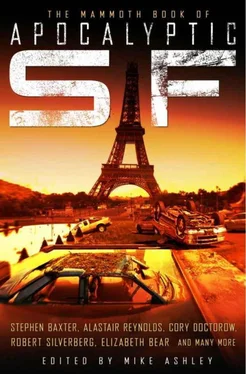However, the gun still fired big, horrid bullets that made holes in stuff, and it was pointing at Mativi.
“I’m sorry, Chet, I can’t let you do it.” The safety catch, Mativi noted, was off.
“Do what?” said Mativi.
“You’re taking away my livelihood. You know you are.”
“I’m sorry, Jean, I don’t understand any of this. Maybe you should explain a little more?” Jean-Baptiste Ngoyi, an unremarkable functionary in the United Nations Temporary Administration Service (Former People’s Democratic Republic of Congo), appeared to have put on his very best work clothes to murder Mativi. The blue UNTASFOR-DEMRECONG logo was embroidered smartly (and widely) on his chest pocket.
“I can’t let you take them away.” There were actually tears in the little man’s eyes.
“Take what away?”
“You know what. Everybody knows. They heard you talking to Grosjean.”
Mativi’s eyes popped. “No. Ohhh shit. No.” He leaned back against crumbling postmodernist plasterwork. “Jean, don’t take this personally, but if someone as far down the food chain as you knows, everyone in the city with an e-mail address and a heartbeat knows.” He looked up at Ngoyi. “There was a microphone in the comms booth, right?”
“No, the geek who mans the desk is President Lissouba’s police chief s half-brother. The police are full of Lissouba men who were exonerated by the General Amnesty after the Armistice.”
“Shit. Shit. What are they doing, now they know?”
“‘Emergency measures are being put in place to contain the problem’. That’s all they’d say. Oh, and there are already orders out for your arrest For Your Own Safety. But they didn’t know which hotel you were staying in. One of them was trying to find out when he rang me.”
Mativi walked in aimless circles, holding his head to stop his thoughts from wandering. “I’ll bet he was. God, god. And you didn’t tell them where I was. Does that mean you’re, um, not particularly serious about killing me?” He stared at Ngoyi ingratiatingly. But the gun didn’t waver — at least, not any more than it had been wavering already. Never mind. It had been worth a try.
“It means I couldn’t take the chance that they really did want you arrested for your own safety,” said Ngoyi. “If a UN Weapons Inspector died in Kinshasa, that would throw the hand grenade well and truly in the muck spreader for the police chiefs, after all.”
“I take it some of them are the men who originally installed the containers. If so, they know very well full amnesties are available for war crimes —”
Ngoyi shook his head. “Not for crimes committed after the war.”
Mativi was alarmed. “After?”
“They’ve been using the machines as execution devices,” said Ngoyi. “No mess, no body, no incriminating evidence. And they work, too. The bacheques are terrified of them, will do anything to avoid being killed that way. They think they’re the homes of demons.”
“They’re not far wrong,” muttered Mativi.
“— and then there are the undertakers,” continued Ngoyi. “They’ve been using the machines for mass burials. Otherwise the bodies would just have piled up in the streets in the epidemics. And the domestic waste trucks, about five of them stop there several times a week and dump stuff in through the skylights. And my own trucks —” “Your own trucks?” “Yes. Three times a week, sometimes four or five.” Ngoyi returned Mativi’s accusing stare. “Oh, sure, the UN gives us geiger counters and that bacterial foam that fixes fallout, and the special vehicles for sucking up the fixed material and casting it into lead glass bricks —”
“Which you’re supposed to then arrange for disposal by the IAEA by burial underground in the Devil’s Brickyard in the Dry Valleys of Antarctica,” finished Mativi. “Only you haven’t been doing that, have you? You thought you’d cut a few corners.”
“The UN gives us a budget of only five million a year!” complained Ngoyi. “And by the time that reaches us, it has, by the magic of African mathematics, become half a million. Have you any idea what it costs to ship a single kilo of hazardous waste to Antarctica?”
“That’s what you’re supposed to do,” repeated Mativi, staring up the barrel of the gun, which somehow did not matter quite so much now.
“We were talking astrophysics in the Bar B Doll only the other night. You told me then that once something crosses the Event Horizon, it never comes out!” said the civil servant, mortified. “You promised!”
“That’s absolutely correct,” said Mativi. “Absolutely, totally and utterly correct.”
“Then,” said Ngoyi, his face brightening insanely, “then there is no problem. We can throw as much stuff in as we want to.”
“Each one of those containers,” said Mativi, “is designed to hold a magnetically charged object that weighs more than ten battleships. Hence the reinforced concrete floor, hence the magnetized metal casing that attracts every bit of ferrous metal in the room. Now, what do you think is going to happen if you keep piling in extra uncharged mass? Nothing that crosses the Event Horizon comes out, Jean. Nothing. Ever. Including you, including me, including Makemba and Kimbareta and little Laurent.”
Ngoyi’s face fell. Then, momentarily, it rose again.
“But our stuff is only a few hundred kilos a week,” he began. “Much less than what the domestic waste people put in.”
“I feel better already. You’re not going to be personally responsible for getting the whole planet sucked into oblivion, it’s going to be some other guy-”
“The sewage outlet, mind you,” continued Mativi. “That must be pumping in a good thousand litres a day.”
Mativi’s jaw dropped.
“Sewage outlet?”
“Sure. The sanitation guys rerouted the main waste pipe for the city as a temporary measure. They have to keep replacing the last few metres — the machine keeps eating the pipe.” Ngoyi shrugged. “How else do you think they keep five million people’s shit out of the drinking water?”
“Jean-Baptiste, you people have to stop this. You have to stop it now. You have absolutely no idea what you’re doing.”
The gun was still pointing at the centre of Mativi’s chest; now, just for a moment, it stopped wavering and hit dead centre.
“I know exactly what I’m doing. I am making sure I can feed my wife and children.”
The finger coiled round the trigger, slowed down as if falling down gravity slopes. Mativi winced.
The gun clunked and did nothing.
Ngoyi stared at his uncooperative weapon tearfully.
“I must warn you,” lied Mativi, “that I led my university karate team.”
“You should leave,” said Ngoyi. “I think I recognized the municipal sanitation inspector’s car following the bus I took down here. He had a rocket-propelled grenade launcher on his parcel shelf.”
The road surface rose and fell under the Hyundai like a brown ocean swell, testing its suspension to the limit. Mativi heard things grounding that probably ought not to.
“Can I drop you off anywhere?” He braked gently as the traffic hit the blast craters around the freeway/railway junction, which had been a prime military target. Robot repair units were still working on it, and their operators did not pay much attention to cars that weighed one tenth what a mine clearance tractor did. The streetlights seemed to be out on this stretch of road, and the only illumination came from car headlights bouncing up and down like disco strobes. The robot tractors did not need visible light to see.
“The stadium will do fine. I can catch a bus out to Ndjili from there.”
Читать дальше












